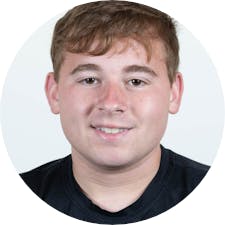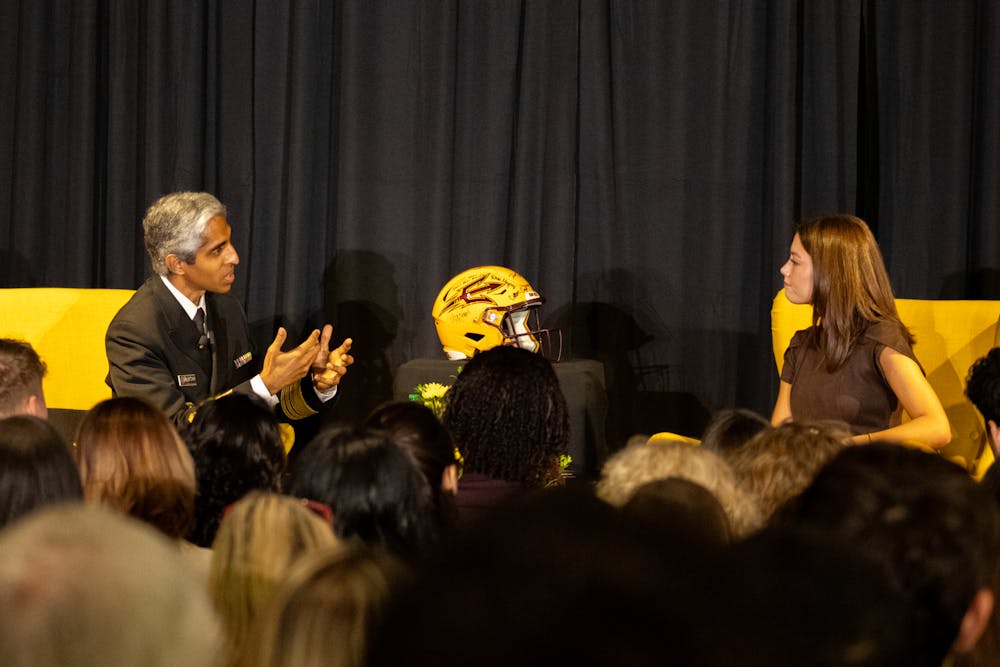Vivek Murthy, Surgeon General of the United States, came to ASU on Monday for his "We Are Made to Connect Tour."
The town hall-style discussion, facilitated by Emma Broyles, a senior studying biomedical sciences, centered around the pervasive issue of loneliness and the importance of fostering social connections to improve health and well-being.
Murthy said he is "deeply worried about the mental health crisis among young people," and he thinks "it's the defining public health challenge of our time."
The Surgeon General identifies factors such as COVID-19 and a lack of environmental awareness as primary contributors to the worsening mental health of individuals in the U.S.
In the last few years, COVID-19 "took a serious toll on our mental health and well-being," Murthy said. "It created invisible wounds which impact how we show up in our work and our school."
Murthy said addressing mental pain is equally important as physical pain.
"As human beings, we seek to relieve pain when we are experiencing it," Murthy said. "We can feel mental pain just as deeply as physical pain."
READ MORE: Insight: Living alone and longing for companionship
Before the event, event organizers sent out a poll question asking about attendees' sense of connection at ASU. Murthy later said over 80% of respondents expressed a lack of connection or a desire for increased connection at the University.
"Seeing that people have a community where you can feel safe and feel protected gives me the strength to open up (about depression)," said Prince Singh, a graduate student studying mechanical engineering who attended the event.
"I wasn’t even comfortable sharing that with my family, but now I am sharing that with a stranger," Singh said.
Social connection is a key factor in solving loneliness, according to Murthy.
The University offers free counseling and group therapy to connect students to resources in an effort to help. Murthy said that there is growing accessibility for mental health support with expanded campus services and the introduction of the crisis line, 988, which connects individuals to trained mental health counselors via call or text.
"When you check in on someone, you aren’t just checking in on someone," Murthy said. "You are seeing a person and their value."
The quality of the connections matters more than the quantity of people. In other words, it's important to consider deep connections rather than hundreds of online acquaintances, according to Murthy.
READ MORE: Navigating the college social scene brings challenges and rewards
Broyles also opened up about her personal struggles with anxiety and depression she experienced during her time as Miss America and how she couldn’t eat or sleep for two weeks after giving up her title.
"I am an international student, and I am struggling with being lonely without parents," said Samrat Serikkaliyev, a junior studying business data analytics. "This event was important because now I will find ways to cope with these feelings."
Murthy compared social connections to the foundation of a house and the importance of having people feel "aware and empowered."
"I especially appreciated Dr. Murthy taking time out of his talk and asking the audience to message someone they are grateful for," said Pilar McCann, a senior studying neuroscience and psychology. "It emphasized the importance of his message and offered me time to reflect on those that I care for. By prioritizing real connections with people over the false connections sometimes offered by social media, we have the ability to strengthen our mental health."
Edited by Grey Gartin, Walker Smith and Jasmine Kabiri.
Reach the reporters at hrhea@asu.edu, ssudha13@asu.edu and glmcfar1@asu.edu.
Like The State Press on Facebook and follow @statepress on X.
Ginia is a junior studying journalism and mass communication with a minor in criminology. This is her third semester with The State Press. She has also worked at Arizona Capital Times and KTAR News.

Hunter is a senior studying technological leadership. This is his fourth semester with The State Press. He has also worked as a legislative intern.




